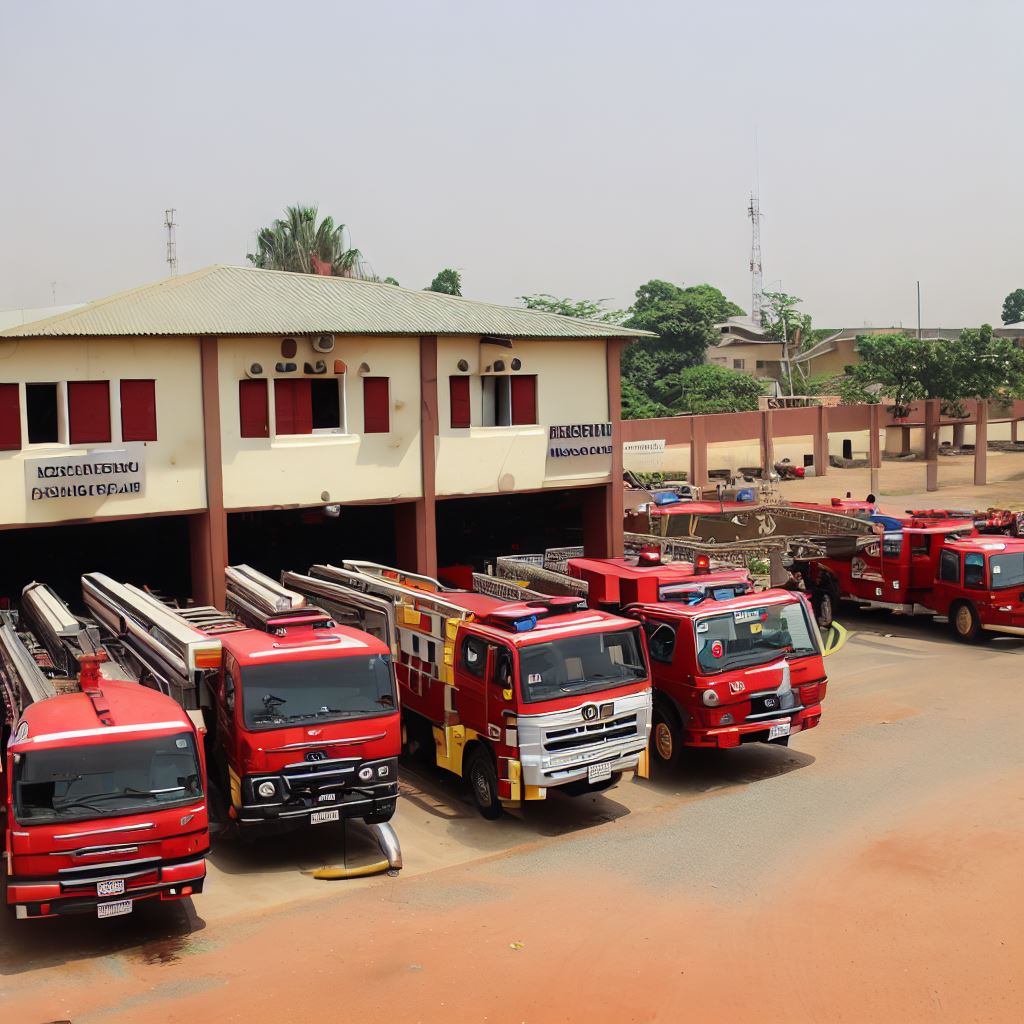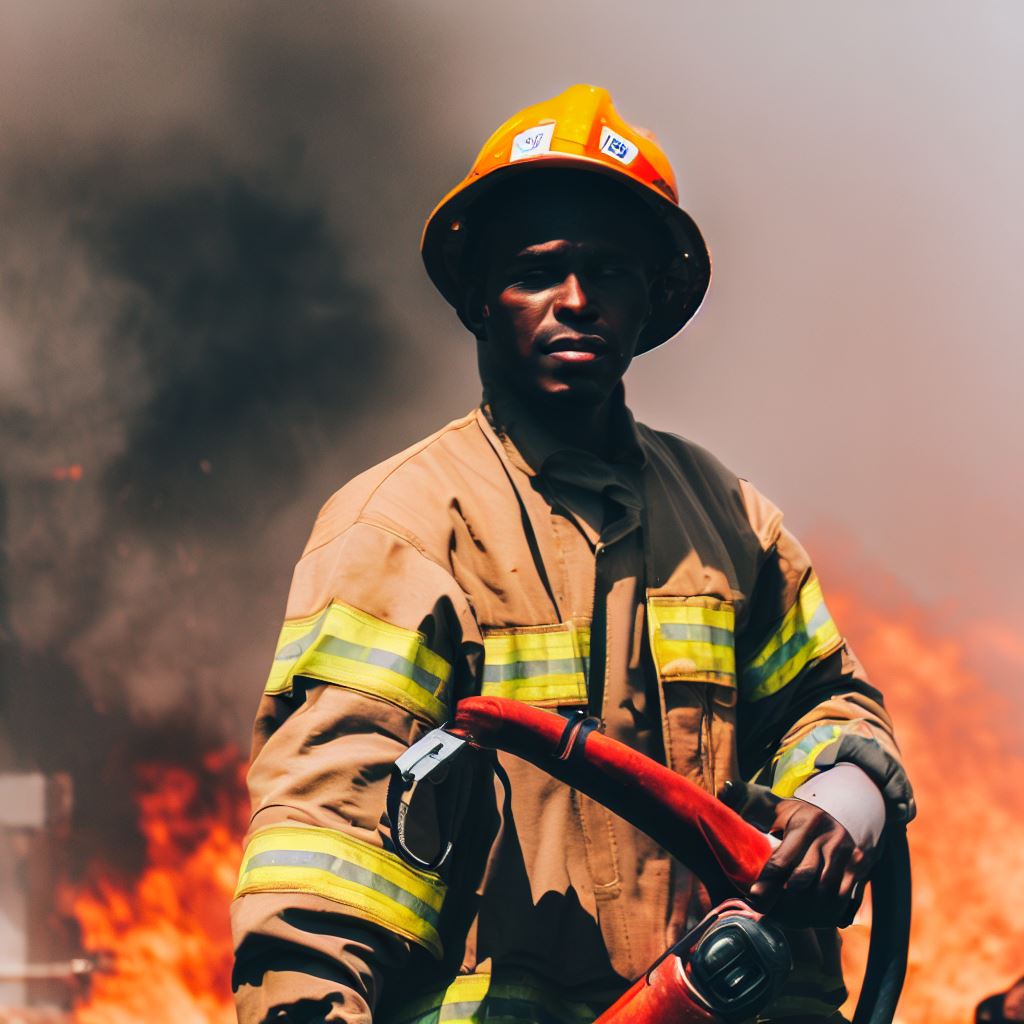Introduction
When discussing Nigeria Fire Fighter Salaries, Understanding firefighter salaries is important for assessing the industry’s overall compensation and job satisfaction.
Nigeria’s firefighting sector is crucial in protecting lives and property from fires and emergencies.
Firefighters play a vital role in every society as they are at the forefront of firefighting and rescue operations.
In Nigeria, the firefighting sector is responsible for battling fires, responding to emergencies, and saving lives.
With a population of over 200 million people, Nigeria faces numerous fire and emergency incidents on a daily basis.
The demands placed on firefighters are immense, requiring them to be highly skilled, physically fit, and well-equipped to handle any situation.
In order to attract qualified and dedicated individuals to the profession, it is essential to have a comprehensive understanding of firefighter salaries in the country.
This includes not only the basic pay but also the benefits and allowances provided to firefighters.
Salaries vary depending on the level of experience, rank, and qualifications of the firefighter.
Salaries in Nigeria’s firefighting sector are generally modest, with entry-level firefighters earning around ₦50,000 to ₦70,000 per month.
Firefighting officers in higher ranks can earn up to ₦200,000 or more.
It is important to consider the demanding nature of the job and the risks involved when assessing firefighter salaries.
Firefighters often work long hours, including night shifts and weekends, and are exposed to hazardous environments.
They put their lives on the line every day to protect their communities.
In fact, understanding Nigeria’s firefighter salaries is crucial for evaluating the compensation and job satisfaction in the firefighting sector.
Given the critical role they play in the safety and wellbeing of communities, it is essential that firefighters are adequately rewarded for their sacrifices and dedication.
Factors Affecting Firefighter Salaries in Nigeria
When discussing Nigeria Fire Fighter Salaries, it’s essential to delve into the intricate web of factors influencing this crucial aspect of compensation.
These factors are the threads that weave the fabric of firefighters’ earnings.
- Experience and Expertise: Seasoned firefighters, with their wealth of experience, often command higher salaries. Their years in service translate into invaluable knowledge and capabilities, making them indispensable assets in emergency situations.
- Education and Certifications: Advanced training and qualifications open doors to increased earnings. Firefighters armed with specialized certifications, like hazardous materials handling or emergency medical services, are rewarded for their dedication to continuous learning.
- Rank Matters: Within the firefighting hierarchy, higher-ranking officers enjoy heftier paychecks. Fire chiefs and captains, for example, earn more compared to their entry-level counterparts.
- Location: Firefighters in urban areas tend to earn more, reflecting the higher cost of living and greater demand for their services.
- Cost of Living: The cost of living directly influences salaries to ensure that firefighters can make ends meet comfortably.
- Unconventional Hours: Firefighters brave night shifts, weekends, and holidays. Shift differentials and overtime pay are their allies in boosting their income.
- Union Power: Strong firefighter unions negotiate favorable salaries and benefits through collective bargaining agreements.
- Government and Budgets: Government policies and budget allocations can sway salaries, as fire departments rely on public funding.
- Additional Roles and Skills: Firefighters who take on specialized responsibilities are rewarded accordingly, recognizing their unique skills.
- Training and Equipment: The cost of training and maintaining firefighting equipment indirectly affects salaries, with limited budgets potentially impacting earnings.
In the grand scheme of things, a firefighter’s salary is a complex interplay of these factors.
Their dedication and bravery in safeguarding lives and property merit fair compensation, making their role invaluable in Nigeria.
Salary Structure for Firefighters in Nigeria
Firefighters play a crucial role in safeguarding lives and properties from fire outbreaks and other emergencies.
They bravely risk their lives to ensure public safety and deserve fair compensation for their efforts.
In Nigeria, the salary structure for firefighters follows a specific breakdown.
A. Basic Salary Breakdown
- Entry Level Salary: When starting their career, firefighters in Nigeria usually earn a basic salary of ₦80,000 to ₦100,000 per month.
- Mid-Level Salary: As firefighters gain experience and progress in their career, their monthly basic salary can increase to ₦120,000 to ₦150,000.
- Senior-Level Salary: Firefighters who reach senior positions, such as Chief Fire Officer, can earn a basic salary ranging from ₦180,000 to ₦250,000 per month.
B. Allowances and Benefits Provided
- Housing Allowance: Firefighters are entitled to a housing allowance, which varies depending on their rank and location. It helps them cover their accommodation expenses.
- Transport Allowance: To facilitate their mobility, firefighters receive a transport allowance. This allowance covers their commuting costs.
- Medical Allowance: Firefighters have access to medical allowances that cover their healthcare expenses, including hospitalization and medication.
- Risk Allowance: Due to the hazardous nature of their job, firefighters receive a risk allowance to compensate for the risks they face.
- Uniform and Kit Allowance: Firefighters are provided with uniforms and necessary equipment to perform their duties effectively. They receive an allowance for the maintenance and replacement of these items.
C. Overtime and Hazard Pay Considerations
- Overtime Pay: Firefighters often work long hours beyond their regular shifts, especially during emergencies. They receive overtime pay for these additional hours worked.
- Weekend and Public Holiday Pay: Firefighters are eligible for extra pay when they work on weekends or public holidays, as these are considered premium working days.
- Hazard Pay: Firefighting involves significant risks, including exposure to fire, smoke, and various hazards. In recognition of this, firefighters receive hazard pay as compensation.
In review, Nigeria’s firefighters receive a structured salary package that includes a basic salary, allowances, and benefits.
The salary increases with experience and rank, providing motivation for career progression.
Additionally, firefighters receive overtime pay, hazard pay, and extra compensation for working on weekends and public holidays.
These measures reflect the recognition of their invaluable contribution to public safety.
Read: Challenges and Triumphs: Fire Fighting in Nigeria

Comparison with Other Professions in Nigeria
A. Contrast firefighter salaries with other government jobs
Firefighters play a vital role in Nigeria’s emergency response system.
They are the first line of defense when it comes to combating fires and rescuing people from dangerous situations.
However, the salaries of firefighters in Nigeria have been a topic of concern and debate.
In this section, we will explore and compare firefighter salaries with other professions in Nigeria, both in the government and private sectors.
When it comes to government jobs in Nigeria, there is a stark contrast between firefighter salaries and those of other professions.
Government jobs, in general, are known for providing stable and relatively well-paying positions. However, firefighters seem to be an exception.
Despite the risks and demands of their job, their salaries are often significantly lower compared to other government positions.
1. Police Officers
One of the professions that can be compared to firefighting is that of police officers.
While both professions entail significant risks and responsibilities in ensuring public safety, police officers tend to earn higher salaries compared to firefighters in Nigeria.
This difference in salary between the two professions raises questions about the recognition and value placed on firefighters’ crucial work.
2. Civil Servants
In comparison to other civil servants, such as teachers and administrative staff, firefighters also receive lower salaries.
This discrepancy is particularly concerning when considering the physical and mental strain firefighters endure to protect lives and properties.
Recognizing their efforts and providing fair wages is essential to motivate and retain qualified firefighters.
B. Salary differences between firefighting and private sector jobs
When we shift our focus to the private sector, the contrast in salaries becomes even more apparent.
Private sector jobs are often seen as more lucrative and offer higher earning potential.
- Oil and Gas Industry: Nigeria’s oil and gas industry is known for its high salaries and attractive benefits packages. Engineers and professionals working in this sector earn significantly more than firefighters.
This disparity raises questions about the priorities and value placed on different professions in the country. - Banking Sector: Similarly, the banking sector offers competitive salaries and bonuses. Financial analysts, managers, and executives in banks earn far more than firefighters.
This difference in remuneration can act as a deterrence for individuals considering a career in firefighting, potentially leading to a shortage of qualified firefighters in the long run.
It is crucial to evaluate the salary differences between firefighting and other professions in both the government and private sectors.
By doing so, we can highlight the need for fair compensation for firefighters, considering the risks and sacrifices they make daily.
Recognizing their importance and providing adequate wages can help attract and retain qualified individuals in this critical profession.
In general, the comparison between firefighter salaries and those of other professions in Nigeria reveals significant discrepancies.
Both in the government and private sectors, firefighters earn considerably less than their counterparts in similarly demanding and essential positions.
Recognizing the value of their work and providing fair remuneration is essential to ensure a strong and motivated firefighting force in Nigeria.
Read: Fire Fighter Training: A Guide to Courses in Nigeria
Challenges and Disparities in Firefighter Salaries
When it comes to firefighting in Nigeria, there are several challenges and disparities in terms of salaries.
These issues can have a significant impact on the morale and efficiency of the fire service.
A. Regional Variations and Disparities
- One major challenge is the regional variations and disparities in firefighter salaries across Nigeria.
- These disparities often arise due to differences in economic development and cost of living between states.
- Firefighters in more affluent states tend to receive higher salaries compared to their counterparts in less developed regions.
- This creates significant disparities, not only in the amount of salary received but also in the purchasing power and quality of life for firefighters.
- The lack of a standardized salary structure across the country further exacerbates this issue.
B. Corruption Issues Affecting Salary Distributions
- Corruption is another challenge that affects firefighter salaries in Nigeria.
- In some cases, funds allocated for firefighter salaries are embezzled or misappropriated by corrupt officials.
- This leads to delayed, incomplete, or irregular salary payments for firefighters.
- Corruption not only affects the financial well-being of firefighters but also undermines their motivation and dedication to their duties.
- Efforts should be made to tackle corruption within the system to ensure firefighters receive their rightful salaries.
C. Lack of Proper Benchmarking and Salary Scales
- The lack of proper benchmarking and salary scales is yet another challenge faced by Nigerian firefighters.
- Without a standardized system for determining salaries, there is a lack of transparency and fairness in remuneration.
- The absence of clear guidelines and criteria for salary increments and promotions also contributes to disparities.
- It is crucial to establish proper benchmarking methods and salary scales based on qualifications, experience, and job responsibilities.
- This will help ensure that firefighters are compensated fairly and motivate them to perform their duties effectively.
In short, firefighter salaries in Nigeria face numerous challenges and disparities.
Regional variations, corruption issues, and the lack of proper benchmarking all contribute to the inequality in pay.
It is essential for the government and relevant authorities to address these issues and work towards a fair and standardized salary structure.
By doing so, they can provide firefighters with the compensation they deserve and encourage their commitment to saving lives and protecting communities.
Read: Nigeria’s Fire Fighting: A Day in the Life of a Hero
Efforts to Improve Firefighter Salaries
Firefighters play a crucial role in ensuring the safety and well-being of communities.
They put their lives on the line to protect lives and property from the devastating effects of fire.
However, their salaries have often been a topic of concern, with many firefighters struggling to make ends meet.
In this section, we will explore the efforts made to improve firefighter salaries.
A. Government Initiatives and Interventions
- Recognizing the importance of adequately compensating firefighters, governments have taken steps to address the issue.
- Some governments have increased the funding allocated to fire departments, enabling them to offer better salaries.
- Legislation has been passed in several regions to ensure that firefighters are paid fair wages that reflect the risks they face.
- Additionally, governments have implemented policies to attract and retain skilled firefighters, including financial incentives.
B. Role of Labor Unions in Negotiating Salary Increments
- Labor unions have played a crucial role in advocating for improved firefighter salaries.
- Through collective bargaining, unions negotiate with fire departments and government bodies to secure better pay for firefighters.
- Unions have successfully organized strikes and protests to raise awareness of the issue and put pressure on decision-makers.
- By representing the interests of firefighters, unions have been instrumental in achieving salary increments.
C. Impact of Training Programs and Professional Development
- Training programs and professional development opportunities have a significant impact on firefighter salaries.
- Firefighters who undergo specialized training and acquire additional certifications often receive higher pay.
- These programs not only enhance the skills and knowledge of firefighters but also make them more valuable to their departments.
- Fire departments are more willing to invest in firefighters who have received advanced training, leading to better salaries.
In fact, the efforts to improve firefighter salaries have seen positive results.
Governments have recognized the importance of adequately compensating firefighters and have taken steps to increase funding.
Labor unions have played a vital role in negotiating salary increments through collective bargaining and raising awareness.
Additionally, training programs and professional development opportunities have contributed to higher salaries by enhancing firefighter skills and value.
While there is still room for improvement, these efforts demonstrate a commitment to recognizing the valuable contributions of firefighters and ensuring they are appropriately compensated for their brave and essential work.
Read: Workshops & Events: Coating Tech Education in Nigeria
Conclusion
This blog post has provided a comprehensive overview of Nigeria’s firefighter salaries.
We have discussed key points such as the current salary structure, the challenges faced by firefighters, and the need for fair compensation.
It is evident that firefighters play a crucial role in protecting lives and properties, often putting their own lives at risk.
However, the current situation in Nigeria does not reflect the importance of their work, as their salaries are significantly low.
It is of utmost importance to prioritize the enhancement of firefighter salaries in Nigeria.
By doing so, we can attract more talented individuals to join the profession and ensure that firefighters are motivated to perform their duties effectively and efficiently.
In order to address this issue, it is essential for the government and relevant authorities to recognize the importance of fair compensation for firefighters.
Adequate funding should be allocated to ensure that their salaries are commensurate with the risks they face and the critical services they provide.
In the end, improving firefighter salaries is not only a matter of fairness but also serves as a way to enhance the overall firefighting system in Nigeria.
It is a step towards ensuring the safety and well-being of both firefighters and the general public.
Therefore, it is crucial for all stakeholders to come together and take action to prioritize the enhancement of firefighter salaries in Nigeria.
It is time to recognize and value the important work done by firefighters and provide them with the compensation they deserve.





That is good we will be better!
Yes o, It can only get better.